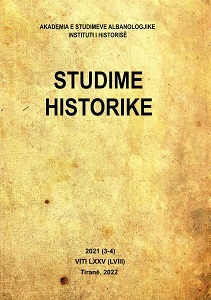DEMONSTRATAT NË KOSOVË NË VITIN 1981 DHE NACIONALIZMII REGJIMIT KOMUNIST TË TIRANËS - NJË ANALIZË E SHTYPIT SHQIPTAR
THE 1981 REVOLTS IN KOSOVA AND THE NATIONALISM OF THE TIRANA’S COMMUNIST REGIME - AN ANALYSIS OF THE ALBANIAN PRESS
Author(s): Artan HoxhaSubject(s): Media studies, Political history, Social history, Post-War period (1950 - 1989), History of Communism
Published by: Qendra e Studimeve Albanologjike
Keywords: Nationalism; realpolitik; Albania; Kosovo; Yugoslavia; Soviet Union; irredentism;
Summary/Abstract: This article discusses the fluidity of the Albanian communist’s nationalist discourse. It takes as a case study the reaction of the ALP’s leadership to the demonstrations that occurred in Kosova in 1981 and uses the Albanian press as a lens to explore the transformation of its nationalist discourse. Combining press with Enver Hoxha’s diary and archival resources from the ALP collection, enables a fuller understanding of the gap between public declarations and the calculations behind the stage. A meticulous analysis of the articles the Albanian communist press published on the events of 1981 in Kosova, reveals the contradictions in which Tirana’s communist regime was caught. From the perspective of realpolitik, the ALP’s leadership considered Yugoslavia as a buffer zone between its borders and the countries of the Warsaw Treaty. Yugoslavia kept the Soviet armies away from the Albanian borders, thus preventing any Moscow’s attempt to intervene and change the ALP’s leadership. On the other hand, the Albanian communist top echelons, could not abandon publicly the Kosovar protesters. Ultimately, the course of events in Kosova and the reaction of the Serbian leadership gradually solved the tension between realpolitik and nationalism. Indeed, Hoxha did distinguish the Yugoslav leadership from the Serbian one. While the Croatians and Slovenians held a moderate stance toward the events of 1981 in Kosova, the Serbians used an inflammatory nationalist language against both the Albanian Kosovars and the ALP’s leadership. Observing the international reaction to the demonstrations in Kosova, Hoxha concluded that Moscow was backing the Serbian leadership because Kremlin considered Serbian nationalism as a tool for extending its influence in the western part of the Balkans. After the Albanian communist leadership reached this conclusion, Tirana regime’s press took a decisive turn and openly supported the claims ofthe Kosovar Albanians for transforming Kosova into the seventh republic of Yugoslavia. However, the ALP’s leadership did not embrace an irredentist agenda. In Hoxha’s calculations, the transformation of Kosova into a republic would dilute the power of the Serbians within the federation, thus hampering the growth of Soviet influence around his neighborhood. Hoxha’s goal indeed, was the preservation of Yugoslavia, a sine qua non, according to him, for the survival of his power.
Journal: Studime Historike
- Issue Year: 2021
- Issue No: 03-04
- Page Range: 169-194
- Page Count: 26
- Language: Albanian
- Content File-PDF

